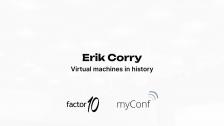Jimmy Nilsson, Anders Wengelin and Vadim Feldman at myConf 2023
Platform Strategies - Business Value Increased Exponentially

Platform Strategies - Business Value Increased Exponentially

Maximizing your context Have you ever wondered why some people make the most of a situation? The same question applies to companies, communities and even countries. I have tried to answer this question by looking at my own life and work - the circumstances under which I made decisions that worked out better or worse. And I tried to answer the question again for people with whom I have interacted over a significant period. There is something about maximising the variables in specific contexts that leads to success. In this talk, I share my thoughts on maximising the context in which we find ourselves, and when we do so, we maximise value for others too.

Virtual machines in history Join Erik for a historical view of his work on virtual machines, regular expression engines, garbage collection and language development that empathises with the users. We start the journey with the V8 JavaScript engine (with surprising anecdotes from the early days). Then we move on to Dart VM and end the talk with Toit VM, the new tiny VM that makes embedded devices feel like real computers. During this, he will talk about how your tools should not hate you, rant more about tools that stab you in the back, especially Golang, and end up with how the Toit GC manages your memory without stealing your memory.

Sustainability by Design An application, IT system or website is considered DIRTY if sustainability has not been taken into consideration when building and running them. To lower the climate footprint from data and IT systems, we need to empower the ones creating these systems: the software developers.

Investing in the Next Generation of Tech Talent South Africa has the highest level of inequality in the world. At WeThinkCode, we encourage young innovators to believe in the possibility that a line of code can make theirs a more egalitarian society. In this talk, I reflect on building a training academy that celebrates diversity and inclusion to create maximum value. By training young South Africans as software developers, we are maximising the value of our country's human capital and unlocking the innovative capacity of the next generation of geeks.

Maximizing Value by Minimizing Repeated Failure Feedback loops are an essential part of software development. Or, at least, they should be. As a consultant, I always try to optimize the feedback loops; between stakeholders and team, between team and management, between different teams and within the team itself. Listen to this talk about how to fix the loops that turn out not to be loops but just half circles with arrows.
Denna sida använder cookies för att kunna ge dig den bästa möjliga upplevelsen.
Okej, då vet jag!Läs mer
Bädda in